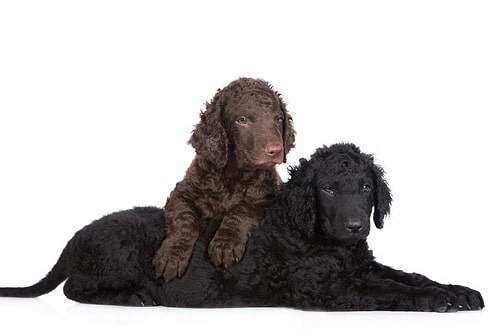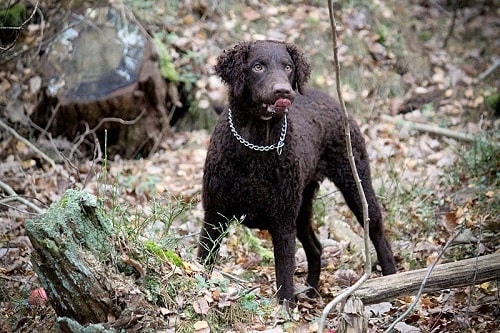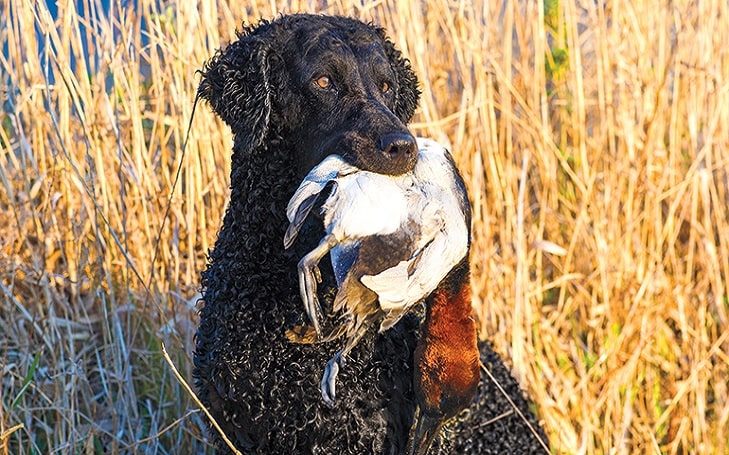Curly-Coated Retriever Diets and Supplements
The Curly-Coated Retriever is a very versatile gun dog with a proud, smart, hard-working, and confidant temperament. It is a very active dog breed that needs the right kind of nutrition and a complete diet. With the right feeding, you can increase the chances of living your dog long and healthy.
In this article, you will learn about the diets, dog food, supplements, and many more about your Curly-Coated Retriever. It is important to know about their diets and feeding methods for their healthy meal and a healthy body.
Diets
A complete diet should be given to your Curly-Coated Retriever to ensure its healthy gut. Whether you are buying manufactured dog food or making a meal for your dog at home, it is important that it contains all the nutrition needed for your dog.
Protein: Protein helps in the formation of bones, muscles, skin, hair, blood, and many more. When the protein breaks down, it creates amino acids and your dog needs 10 out of 23, which should be supplied from its diet. Therefore to maintain its healthy body, the Curly-Coated Retriever puppy needs 29% of protein, and the adult needs around 23% of protein on its diet.
Fat: Fat has many roles in your dog’s body. It provides energy to your dog, it keeps the skin healthy and the coat shiny. They need 5%-8% of fat on their diet.
Carbohydrate and Fiber: Carbohydrate also helps to supply energy to your dog throughout the day. It also helps to generate heat in the body. Your Curly-Coated Retriever needs around 20% of carbohydrate on its diet. Rice and wheat which has carbohydrate also provide with fiber. Fiber keeps the bowel and guts healthy which helps in the normal functioning of the gastrointestinal.
How Much to Feed Your Curly-Coated Retriever?
The feeding of the Curly-Coated Retriever depends on its age and the activity it performs throughout the day. A puppy needs more meals per day as it is in a growing phase and required frequent feeding. Provide 4 meals a day to your 8-12 weeks old puppy. For 3-6 months old puppies, 3 meals a day is all they need.
For an adult 2 lighter meals a day is sufficient, however, it should contain all the nutrition it needs. If your Curly-Coated Retriever is a very active dog, provide him with few treats throughout the day.

Image Source: American Kennel Club
Dog Food For Curly-Coated Retriever
While giving your Curly-Coated Retriever a manufactured dog food, always go for high-quality food that has all the nutritional needs contained in the packet with the right ingredients. Below is the list of dog food for your Curly-Coated Retriever that you can choose from.
- Taste of Wild Premium High Protein Dry Dog Food
- Blue Buffalo Wilderness High Protein Dog Food
- Purina Pro Plan Sport Formula Dry Dog Food
- Victor Dog Food Grain-Free Active Dog and Puppy
Supplements For Curly-Coated Retriever
If there is a lack of some nutrition in your dog’s diet, you can fulfill its nutritional need from supplements. However, if your Curly-Coated Retriever is getting a balanced diet, there is no need to provide him with extra supplements.
Following are the common supplements needs for your Curly-Coated Retriever.
- Fish Oil
- Antioxidants
- Vitamins
- Glucosamine
- Probiotics
Human Food For Curly-Coated Retriever
When you are eating, you sometimes like to give a small portion of food from the plate to your pooch. However, dogs and humans have different digestive systems, so some food can be taken by both whereas some food can be harmful to your dog. Here is the list of food that is found commonly in everyone’s kitchen that your dog can and cannot eat.

Image Source: Doggie Designer
Can Eat
- Peanut (no added sugar and unsalted)
- Carrots
- White rice
- Quinoa
- Watermelon (without seeds)
- Pork
- Turkey
- Popcorn (Plain)
Cannot Eat
- Avocado
- Chocolate
- Raisins and Grapes
- Citrus (too much is bad)
- Garlic and Onion
- Salty Food
Why is Your Curly-Coated Retriever Not Eating?
- There might be loose or broken teeth or even swollen gum. Check if there is any problem in your dog’s teeth or gum which is causing him not to eat properly and take him to a vet for a proper check-up.
- If you are on a trip with your dog and find that he is not eating, it might be because of the new surrounding. Some dogs get motion sickness while other get confused and uncomfortable in the new surrounding.
- A recent medication or vaccination might also be the reason that your dog is not eating. Some medicine causes a temporary loss of appetite.
Visit Doglime for more dog breed information and their feeding methods.
Tags










